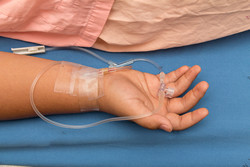Plasticisers in medical devices linked to attention deficit disorders in critically ill children
The study, conducted by the NUTRI-CARE project, believes that the reason behind this is due to a high level of plastic-softening chemicals called phthalates circulating in the blood. The project researchers suggest that these chemicals, which are added to indwelling medical devices (such as plastic tubes and catheters) are able to seep into the child’s bloodstream. The dangers of phthalates Phthalates have long been banned by EU legislation from being used in the production of children’s toys, but the project team emphasises that there is currently no such prohibition for the use of phthalates in medical devices. They discovered a clear match between previously hospitalised children’s long-term neurocognitive test results and their individual exposure to the phthalate DEHP during their stay in intensive care. Di(2-ethylhexyl)phthalate, or DEHP, is the most commonly used plastic softener in medical devices made of polyvinyl chloride (PVC). Sören Verstraete, the project’s lead researcher, called the use of medical devices containing this phthalate ‘potentially harmful’ for the brain development and function of critically ill children. Consequently, he suggests that there may be an urgent need to consider the development of alternative plastic softeners for use in indwelling medical devices. DEHP levels in critically ill children The NUTRI-CARE study included 100 healthy children and 449 children who received treatment in a pediatric intensive care unit (PICU) and underwent neurocognitive testing four years later. Most of the PICU patients were recovering from heart surgery, but some had sustained accidental injuries or had severe infections. The researchers measured blood levels of DEHP metabolites, or byproducts. Initially they performed the blood tests in the healthy children and 228 of the patients whilst they were in the PICU. Patients had one to 12 medical tubes in the PICU and ranged in age from newborn to 16 years. They found that DEHP metabolite levels were not detectable in the blood samples of healthy children. However, at admission to the PICU, the critically ill children, already connected to catheters, had levels that the project team has called ‘sky-high.’ Although the DEHP levels decreased rapidly, they remained 18 times higher until discharge from the PICU compared with those of healthy children, Verstaete said. Then the research team conducted statistical analyses that adjusted for the patients' initial risk factors that could influence the neurocognitive outcome as well as length of stay, complications and treatments in the PICU. A high exposure to DEHP during the PICU stay, according to the team, was strongly associated with attention deficit found at neurocognitive testing four years after discharge. They validated this finding in a different group of 221 PICU patients. ‘This phthalate exposure explained half of the attention deficit in former PICU patients,’ Verstaete commented, adding that other factors may account for the other half. The NUTRI-CARE project is being coordinated from Belgium’s KU Leuven and has received EUR 2 500 000 in EU funding. The project team is due to present the results of this study to the Endocrine Society’s 98th annual meeting in Boston, US, on Friday 8 April 2016. The project will run until March 2018. For more information please see: project page on CORDIS(opens in new window)
Countries
Belgium



